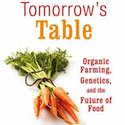 Tomorrow’s Table: Organic Farming, Genetics, and the Future of Food, Pamela Ronald and Raoul Adamchak (Oxford University Press, USA, 2010)
Tomorrow’s Table: Organic Farming, Genetics, and the Future of Food, Pamela Ronald and Raoul Adamchak (Oxford University Press, USA, 2010)
In modern agricultural politics, organic farming and genetic engineering occupy opposite ends of the spectrum. In the Ronald-Adamchak household, the world is not so black and white. Ronald is a professor of plant pathology at the University of California, Davis. Adamchak manages the student-run organic farm on campus. Together, they’re exploring the juncture where their methods can (and they argue, should) meet to ensure environmentally sustainable food production.
Revealing common principles and “leveling the playing field,” this book roughly chronicles one year in the lives of the Ronald-Adamchak family. Through dialogue with friends and family, the authors thoughtfully explore the use of GE agriculture and the concerns expressed by consumers. They discuss the contents of their own largely organic pantry, what they choose to feed their children, and how over the last ten years of their marriage, they have developed a specific criteria for the use of GE in agriculture.
Editor’s note: The authors adhere to a philosophy that sees technology – a mechanistic approach – as the answer to solving the issue of world food security, unlike researchers at the Rodale Institute who are proving that organic methods can feed the world (see Organic Manifesto, Maria Rodale).
Although far from complete, their discussion has value in presenting current academic opinion. Our position is that the science itself is far more incomplete than they are willing to admit.
For further insight into the complexity – and the mystery – of genetic science we suggest:
- Seed to Seed: The Secret Life of Plants, Nicholas Harberd
- Genetics and the Manipulation of Life: The Forgotten Factor of Context, Craig Holdrege

